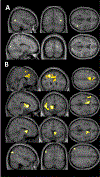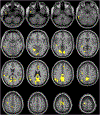Differential effects of estradiol on neural and emotional stress response in postmenopausal women with remitted Major Depressive Disorder
- PMID: 34233228
- PMCID: PMC8349860
- DOI: 10.1016/j.jad.2021.06.040
Differential effects of estradiol on neural and emotional stress response in postmenopausal women with remitted Major Depressive Disorder
Abstract
Background: Estrogen fluctuations throughout the lifespan may contribute to major depressive disorder (MDD) risk in women through effects on brain networks important in stress responding, and mood regulation. Although there is evidence to support ovarian hormone treatment for peri-menopausal depression, postmenopausal use has not been well examined. The objective of this study was to investigate whether estrogen modulation of the neural and emotional cognitive responses to stress differs between postmenopausal women with and without MDD history.
Methods: 60 postmenopausal women completed an fMRI psychosocial stress task, after receiving no drug or 3 months of daily estradiol (E2). fMRI activity and subjective mood response were examined.
Results: In women without a history of MDD, E2 was associated with a more negative mood response to stress and less activity in emotional regulation regions. In women with a history of MDD, E2 was associated with a less negative mood response to stress and less activity in emotion perception regions.
Limitations: This study was limited by open-label estradiol administration and inclusion of participants using antidepressants.
Conclusions: These results support a differential effect of estrogen on emotional and neural responses to psychosocial stress in postmenopausal women with MDD history and may reflect a shift in brain activity patterns related to emotion processing following menopause.
Keywords: depression; estrogen; fMRI; menopause; stress.
Copyright © 2021. Published by Elsevier B.V.
Conflict of interest statement
The authors declare no conflicts of interest.
Figures





Similar articles
-
Estrogen treatment impairs cognitive performance after psychosocial stress and monoamine depletion in postmenopausal women.Menopause. 2010 Jul;17(4):860-73. doi: 10.1097/gme.0b013e3181e15df4. Menopause. 2010. PMID: 20616673 Free PMC article. Clinical Trial.
-
Estrogen administration negatively alters mood following monoaminergic depletion and psychosocial stress in postmenopausal women.Neuropsychopharmacology. 2008 Jun;33(7):1514-27. doi: 10.1038/sj.npp.1301530. Epub 2007 Aug 15. Neuropsychopharmacology. 2008. PMID: 17700646 Clinical Trial.
-
Do estradiol levels influence on the cognitive function during antidepressant treatments in post-menopausal women with major depressive disorder? A comparison with pre-menopausal women.Neuro Endocrinol Lett. 2008 Aug;29(4):500-6. Neuro Endocrinol Lett. 2008. PMID: 18766158 Clinical Trial.
-
Estrogen, Stress, and Depression: Cognitive and Biological Interactions.Annu Rev Clin Psychol. 2019 May 7;15:399-423. doi: 10.1146/annurev-clinpsy-050718-095557. Epub 2019 Feb 20. Annu Rev Clin Psychol. 2019. PMID: 30786242 Free PMC article. Review.
-
Hormone therapy and mood in perimenopausal and postmenopausal women: a narrative review.Menopause. 2015 May;22(5):564-78. doi: 10.1097/GME.0000000000000323. Menopause. 2015. PMID: 25203891 Review.
Cited by
-
Joint Trajectories of Physical Activity and Depressive Symptoms in Postmenopausal Women in China: A Group-Based Dual Trajectory Analysis of the Five-Year Longitudinal Study.J Multidiscip Healthc. 2025 Jul 25;18:4185-4196. doi: 10.2147/JMDH.S521285. eCollection 2025. J Multidiscip Healthc. 2025. PMID: 40741079 Free PMC article.
-
Chronic 17β-estradiol treatment improves negative valence, anhedonic profile, and social interactions in ovariectomized, middle-aged female rats.Front Behav Neurosci. 2025 Jul 2;19:1553501. doi: 10.3389/fnbeh.2025.1553501. eCollection 2025. Front Behav Neurosci. 2025. PMID: 40672384 Free PMC article.
-
Monoamine Neurotransmitters Control Basic Emotions and Affect Major Depressive Disorders.Pharmaceuticals (Basel). 2022 Sep 28;15(10):1203. doi: 10.3390/ph15101203. Pharmaceuticals (Basel). 2022. PMID: 36297314 Free PMC article. Review.
-
Neuroendocrine pathogenesis of perimenopausal depression.Front Psychiatry. 2023 Mar 30;14:1162501. doi: 10.3389/fpsyt.2023.1162501. eCollection 2023. Front Psychiatry. 2023. PMID: 37065890 Free PMC article. Review.
-
Sex and Hormonal Effects on Drug Cue Reactivity and Its Regulation in Human Addiction.Biol Psychiatry. 2025 May 27:S0006-3223(25)01215-6. doi: 10.1016/j.biopsych.2025.05.016. Online ahead of print. Biol Psychiatry. 2025. PMID: 40441339
References
-
- Albert K, Pruessner J, Rabinowitz T, & Newhouse P. (2013). Menstrual phase is associated with differences in brain activity during psychosocial stress. Biological Psychiatry.
-
- Bromet E, Andrade LH, Hwang I, Sampson NA, Alonso J, de Girolamo G, de Graaf R, Demyttenaere K, Hu C, Iwata N, Karam AN, Kaur J, Kostyuchenko S, Lépine JP, Levinson D, Matschinger H, Mora MEM, Browne MO, Posada-Villa J, … Kessler RC (2011). Cross-national epidemiology of DSM-IV major depressive episode. BMC Medicine. 10.1186/1741-7015-9-90 - DOI - PMC - PubMed
Publication types
MeSH terms
Substances
Grants and funding
LinkOut - more resources
Full Text Sources

